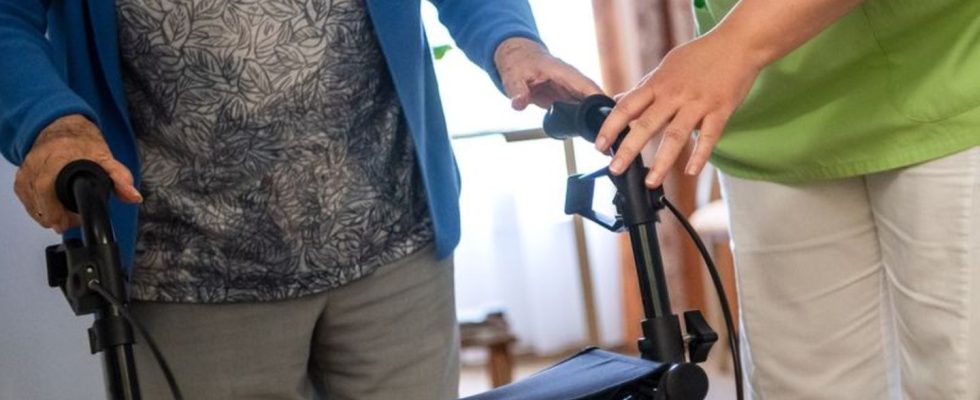Opinion poll
Majority for the end of co-payments for care in homes
Home residents have to contribute their own share for the care, which has been increasing for years. photo
© Sina Schuldt/dpa
Nursing home care has been becoming more and more expensive for those in need of care and their families for years. A reform that has just been sealed is intended to slow down the burdens. But the debate about relief continues.
In view of the increasing costs for those in need of care, according to one Poll a majority an end to co-payments for pure care services in homes.
In the survey by the opinion research institute YouGov on behalf of the German Press Agency, 60 percent tended to support the fact that long-term care insurance should cover all costs of care – 24 percent found this in any case, 36 percent said more yes. 17 percent said no, and 8 percent definitely didn’t want it.
costs add up
The background is that the long-term care insurance – unlike health insurance – only pays part of the costs. Home residents have to contribute a personal contribution for pure care, which has been increasing for years. According to data from the Association of Substitute Health Insurance Funds, the nationwide average on January 1st was 1139 euros – after 912 euros at the beginning of 2022.
In the home, there are also payments for accommodation, food and investments in the facilities. Overall, in the first year in the home, the national average was 2411 euros per month out of pocket, 278 euros more than at the beginning of 2022.
Demand: Reduce co-payments
The care reform that has just been passed by Federal Minister of Health Karl Lauterbach (SPD) already provides for greater relief in the personal contributions for pure care – by increasing the surcharges introduced in 2022 as of January 1, 2024. The personal contribution for pure care should be reduced by 15 instead of the previous 5 percent in the first year in the home, by 30 instead of 25 percent in the second year, by 50 instead of 45 percent in the third, and by 75 instead of 70 percent from the fourth year.
The left called for a “system change” in care. “This includes full nursing care insurance covering all nursing costs without own contribution,” said co-party leader Janine Wissler on Tuesday. “It can be financed if all citizens are involved in making contributions.” Even higher earners would have to pay “their fair share”.
Left-wing politician Ates Gürpinar complained that previous “half-hearted reforms” did not protect against financial overload. “We need a system in which good care is possible and is financially supported by society.”
According to the survey, a permanent subsidy from tax funds from the federal budget is favored to finance additional expenses for long-term care insurance in the event of co-payments – this was mentioned by 62 percent of those surveyed. An increase in the care contribution called 15 percent. 8 percent said that it should be financed differently. A total of 2033 people aged 18 and over were interviewed for the survey from June 21 to 23.
According to the care reform, the care contribution will increase by 0.35 percentage points on July 1, and a little more for childless people. However, families with several younger children are relieved. Improvements in services for those in need of care at home are also planned from 2024.

